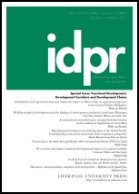
A review of the recent post-disaster recovery interventions in developing countries shows convergent trends in policies and practices. The World Bank has been in a position to exert its influence on post-disaster housing and livelihood recovery interventions, which has resulted in converging policies and practices. This paper focuses on the nexus between housing and livelihood recovery after disasters, highlighting the importance of rethinking the existing sector-based disaster recovery interventions. Focusing on the case studies of the 2001 earthquake in Bhuj, Gujarat, and 2003 earthquake in Bam, Iran, and drawing on subsequent major disasters in Sri Lanka and Pakistan, the article analyses a number of shortcomings in knowledge transfer on post-disaster housing and livelihood recovery. This knowledge transfer has rarely exposed and discussed the limitations of these policies, the gaps in knowledge concerning the impacts of these polices or the lessons learned about recurring problems arising from the interpretation and implementation of these policies. More importantly, the article discusses how the prescriptive nature of best practice housing recovery and the sector-based structure of recovery interventions overlook the needs and priorities of households and impact on their ability to achieve recovery.